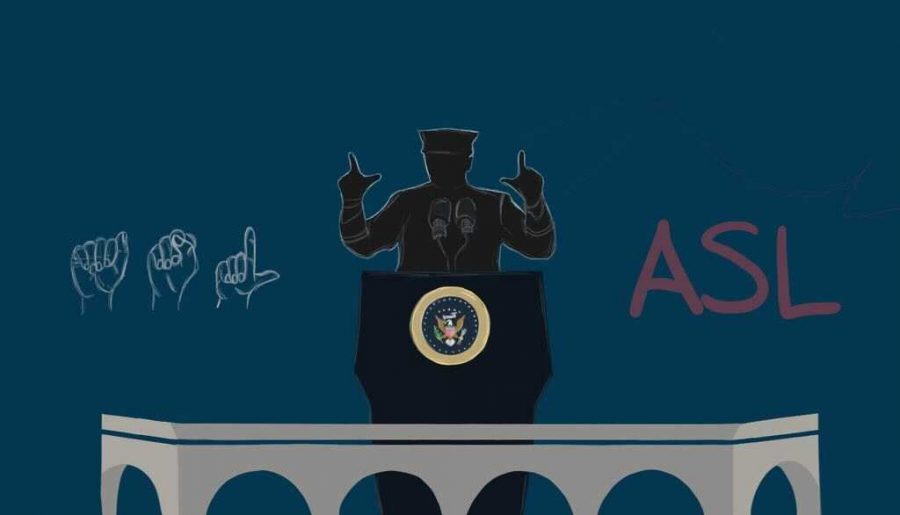Biden’s inauguration is a sign of hope for an administration that supports disabled people
After four years of Donald Trump’s ableist administration, President Joe Biden’s inauguration offers hope for an administration that will work with, respect and support the disabled community.
The most impactful and emotional part of the inauguration ceremony for me wasn’t Lady Gaga’s rendition of the National Anthem, nor was it Vice President Kamala Harris swearing in or even President Joe Biden’s inaugural address. It was the recitation of the Pledge of Allegiance, a mere 24 seconds out of over an hour of ceremony.
As a hard-of-hearing, disabled person myself, seeing Captain Andrea M. Hall sign the Pledge of Allegiance in American Sign Language during the inauguration, for the world to see, brought me hope for an administration that will respect and work with the disabled community.
Donald Trump’s blatantly ableist administration offered virtually no representation or positive acknowledgement of disabled people like myself, whereas even before Biden was officially sworn into office, he offered acknowledgement on one of the largest national platforms: the presidential inauguration. For the past four years, Americans with disabilities have faced a government and administration actively working against them, including during a deadly pandemic.
During his presidency, Trump repeatedly slighted the disabled community by restricting disability benefits, through actions such as planning to cut Social Security Disability Insurance and Supplemental Security Income and rolling back protections against discrimination in healthcare during the COVID-19 pandemic.
As a parting blow in November 2020, he moved to replace administrative law judges who are meant to be impartial with politically motivated agency lawyers to evaluate candidates qualifying for disability benefits and add a new tier to the Continuing Disability Review system. This change would force hundreds of thousands of people to have their qualification for disability benefits re-evaluated and possibly removed.
Outside of policy, Trump has consistently discriminated against and made derogatory remarks toward disabled individuals and community as a whole. For example, he illegally removed braille labels from Trump Tower, stating “Get rid of the f*cking braille. No blind people are going to live in Trump Tower.” He also mocked a disabled reporter on national television and has been recorded saying the r-slur multiple times, including toward a deaf actress.
And that doesn’t even mention how his disgraceful handling of the coronavirus pandemic, which is particularly harmful to the disabled community, a large portion of which is at great risk of severe harm or death upon contracting COVID-19. At COVID-19 briefings, where vital information was distributed, his administration had to be ordered by a judge to provide an ASL interpreter.
The harm Trump has caused to the disabled community during the pandemic is clear in its death toll, but also in less apparent ways. For example, as someone with hearing loss, I rely heavily on lip reading to more accurately understand what people are saying. While I fully support and encourage wearing masks in public, there’s no denying that it makes conversation more difficult. Basic tasks such as picking up food to go end in either a frustrating game of asking people to repeat themselves or asking a family member to pick the food up instead.
Zoom meetings aren’t any better: the audio often cuts out or is distorted, which makes it all the more difficult to understand and amplifies the isolation felt by most in this time. I’ve also been putting off hearing aid maintenance due to the risk of visiting an audiologist in person. And while the lack of ASL in COVID-19 briefings doesn’t affect me as I don’t use sign language, the briefings also often lack accurate captions, leading to a concern that I could miss important safety information.
Joe Biden, on the other hand, actively included the disabled community in his campaign, and clearly outlined his plans to help people with disabilities. Some examples include making healthcare more accessible, enforcing their civil rights and providing support for students with disabilities. However, these plans aren’t just for show in his campaign.
In fact, Biden has a 46-year-long record of supporting the disabled community as a politician. As a senator, he supported multiple bills aimed at helping the disabled community. During his time as Vice President, he worked with Obama to implement multiple acts and aided in the Obama administration hiring 109,575 employees with disabilities. This history of supporting the disabled community throughout his career gives me substantiated hope and even an expectation that he will continue to do so during his presidency.
One of the most salient parts of his plan is to ensure representation by appointing a director of disability policy and hire disabled people for leadership positions within his administration in all sectors, not just those relating to disability programs and policies.
Aside from numerous policy outlines aimed toward helping the disabled community, he also has outlined policies to provide aid to caregivers, including informal and familial caregivers. The extensive policy outlines show a level of thought and care vastly different from the previous administration, and while not groundbreaking in any way, demonstrate Biden’s commitment to working with the disabled community even before taking office.
Even seemingly small actions, like text size on the official White House website, Instagram captions and ASL interpreters through the inauguration, including musical performances, show how Biden and his administration care for the disabled community. Admittedly, these are actions that should be commonplace at national events and otherwise, but after four years of gross ableism, these changes are a welcome relief.
Biden is in no way perfect with his past actions or plans for the future. However, he offers representation for the disabled community in yet another way, simply by speaking openly about his own speech disorder. Despite Trump mocking him during the campaign for his stutter, Biden speaks positively about living with a speech disorder, saying it is his honor to mentor children who also have a speech disorder. His transparency and openness about his speech disorder even when addressing millions is a stark and very welcome contrast from Trump publicly mocking disabled people, and only serves to add to my trust that he will continue to work with, support and help represent the disabled community as president.
This pandemic has been difficult for all of us, and the disabled community has faced additional, unique issues made worse by an ableist administration and president. Though change will not be immediate, Biden’s inauguration is a sign of renewed hope for an administration that will finally respect and work with the disabled community.





